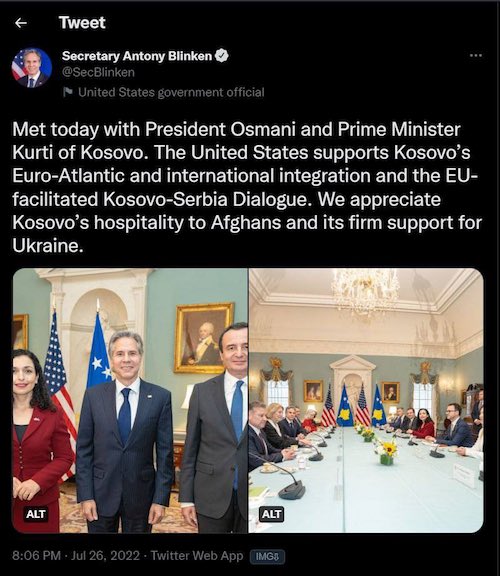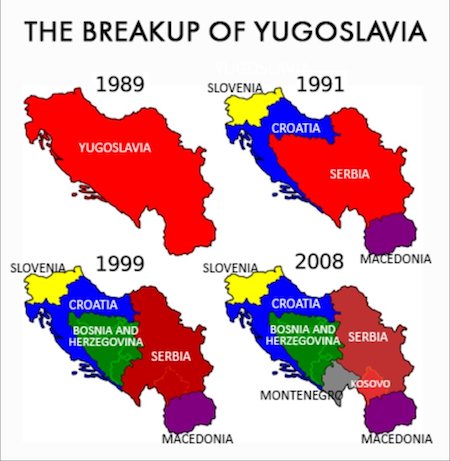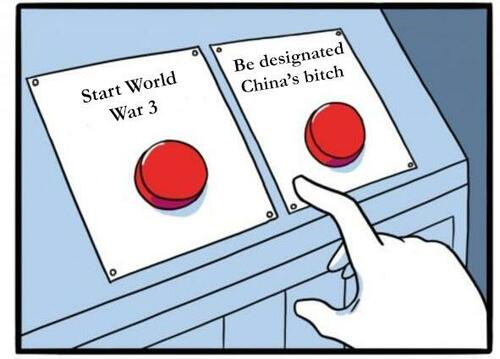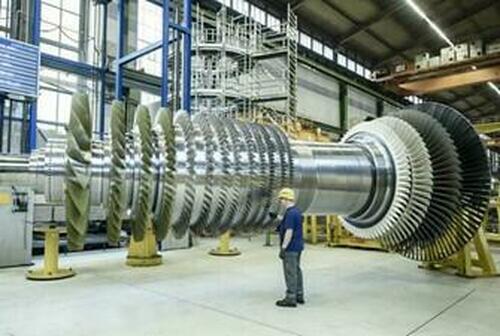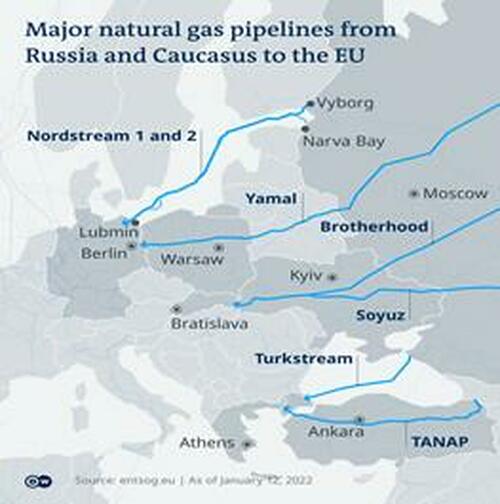The world as seen from a small but still significant island. (Great article!)
Authored by Alasdair Macleod via GoldMoney.com,
Britain’s next Prime Minister must address two overriding problems: London
is at the centre of an evolving financial and currency crisis brought
forward by a change in interest rate trends; and the reality of emerging
Asian superpowers must be accommodated instead of attacked.
This article starts by examining the economic challenges the next Prime Minister faces domestically.
Are the two candidates equipped with a strategy to improve the nation’s
economic prospects, and why can we expect them to succeed where others
have failed?
It is unlikely that either candidate
is aware that there has been a fundamental shift in the direction of
interest rates, the consequences of which are undermining debt mountains
everywhere. The problem is particularly acute for the euro
system. As well as for other major currencies, London operates as the
clearing centre for transactions between the Eurozone’s commercial
banks. If the euro system fails, London’s survival as a financial centre
could be jeopardised.
The other major challenge is geopolitical.
Being tied into America’s five-eyes intelligence network, coupled with
policies to remove fossil fuels as sources of energy Britain is
condemned to falling behind the Asian superpowers, and sacrificing
trading relationships with which her true interests must surely lie.
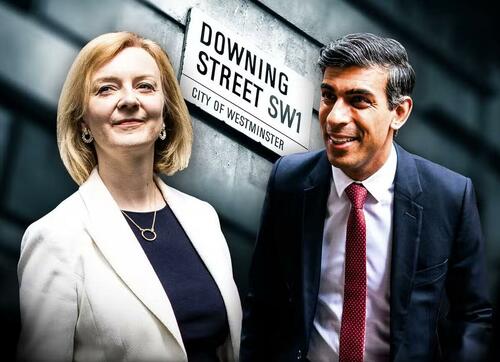
And then there were two…
The
selection process for a new Conservative Prime Minister has whittled it
down to two — Rishi Sunak and Liz Truss. The former is a wealthy
meritocrat, former Goldman Sachs employee and hedge fund manager, the
latter a self-made woman. Sunak was Chancellor (finance minister). Among
several other high-office roles, Truss has been First Secretary to the
Treasury. Both, in theory at least, should understand government
finances. Both studied PPE at Oxford, so are certain to have been
immersed in the Keynesian version of economics, which also informs
Treasury thinking.
Despite their common Treasury experience and
being on that same page, Sunak’s and Truss’s pitches on economic affairs
have been very different. Sunak aims to maintain a balanced budget,
reducing taxes afterwards as economic growth increases tax revenues.
This is Treasury orthodoxy. Truss is claiming she will cut taxes more
immediately in an emergency budget to stimulate growth. She is emulating
the Thatcher/Reagan supply-side playbook.
The politics are
straightforward. The electorate is comprised of about 160,000 paid up
Conservative Party members, mostly leaning towards less government, free
markets, and lower taxes. As a subset of over 40,000,000 voters
nationwide, they may be reasonably representative of a silent majority
in the middle classes which believe in conservative societal values.
The
one issue that matters above all for Conservative Party members is
taxes. Given their different stances on tax, Truss has emerged as the
early favourite. Furthermore, to the disadvantage of Sunak very few
Chancellors make it to Prime Minister for a reason: like Sunak, they
nearly always push the Treasury line on maintaining balanced budgets
over the cycle, which means that they are for ever trying to pluck the
goose for more tax with the minimum of hissing. Don’t expect geese to
willingly vote for yet more exfoliation.
The issue of less
government in the total economy is not properly addressed by either
candidate or is restricted to vague promises to do something about
unnecessary bureaucracy. In arguing for free markets, Truss is stronger
in this respect than Sunak who appears to be more captured by the
permanent establishment.
With the exception of Treasury ministers,
all politicians in office are naturally inclined to seek increased
departmental budgets, which is a problem for all tax cutters. But to
understand the practical difficulties of reducing government spending,
we must make a distinction between departmental expenditure limits and
annually managed expenditure. The former is budgeted for by the Treasury
in its allocation of financial resources. The latter can be regarded as
including additional costs arising from public demand for departmental
services. This explains why total departmental expenditure for fiscal
2020-21 was £566.2bn, representing about half of total government
spending of £1,112bn.
With government spending split 50/50
overall on departmental expenditure limits and public demands for
services, both issues must be addressed when reducing costs
meaningfully. Failing to do so means only departmental expenditure
limits are tackled, resulting in less resources to deliver mandated
public services. That would be seen by the opposition and the public to
be a government failing. Therefore, it is not sufficient to merely say
to ministers that they must cut departmental expenditure, but laws and
regulations must also be changed to reduce public service obligations as
well. That takes time.
Imagine tackling this problem with respect
to the National Health Service. The NHS takes 34% of total departmental
expenditure limits, yet it clearly fails to efficiently provide the
public with the services required of it. Health ministers always argue
that it needs more financial resources. This is followed by education
(13% of total departmental expenditure). What do you do: sack teachers?
And Scotland at 8% is another no-go area, where cuts would likely
encourage the nationalist movement. And that is followed to a similar
extent by defence spending at a time of a proxy war against Russia…
One
could go on about other ministry spending and the costly provision of
their services, but it should be apparent that any realistic cuts in
public services are likely to be minor and overwhelmed by rising and
unbudgeted departmental input costs which are indirectly the consequence
of the Bank of England’s monetary policies. It is therefore hardly
surprising that neither Sunak nor Truss is seriously engaged with the
subject of reducing state spending, merely fluffing around the topic.
But
total state spending is going to be an overriding problem for the
future PM. Figure 1 shows the long-term trend of total managed
expenditure relative to GDP, admittedly exacerbated by covid. Since
then, there has been a recovery in GDP to £2,239bn in the four quarters
to Q1 2022, and covid related disbursements have materially declined, so
that in the last fiscal year, total government spending is estimated to
have dropped to 46.5% of GDP from the high point of 51.9%.
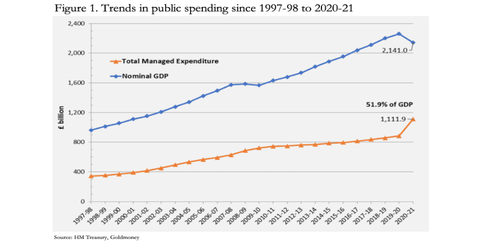
However,
rising interest rates globally are set to drive the UK economy into
recession. Even if the recession is mild, while GDP falls this will
increase public spending on day-to-day public services back up to over
50% of GDP.
The philosophical problem for the new PM can be summed
up thus: with half the economy being unproductive and the productive
economy shouldering the burden, how can economic resources be restored
to producers in a deteriorating economic outlook?
Inflation is not going away
Orthodox
neo-Keynesians in the government and its (supposedly) independent
Office for Budget Responsibility do not recognise that the root of the
inflation problem is the debasement of currency and credit. Furthermore,
by thinking it is a short-term supply chain problem, or a temporary
energy price spike due to sanctions against Russia, the OBR, in common
with the Bank of England takes the view that consumer price rises will
return to the targeted 2% level. Only, it might take a little longer
than originally thought.
Figure 2 shows the OBR’s latest forecasts (in March) for inflation (panel 1) and real GDP (panel 2).

Note
how the October forecast failed to reflect an annual CPI rising to more
than 4%. In March that was raised to 8%, which is already outdated.
Price inflation rising to over 10% is on the cards, and it should be
noted that the retail price index, abandoned by government because of
the cost of using it for indexation, already shows annual consumer
inflation to be rising at 11.8%.
The OBR’s response to these
unwelcome developments is simply to push out an expected return to the
2% inflation target a little more into the future. Similarly, it expects
the trajectory of GDP growth will be maintained, having just slipped a
little.
On this evidence, the OBR’s advice to a future prime
minister and his chancellor will be badly flawed. Instead of going down
the macroeconomic approach of modelling the economy, instead we need to
apply sound, unbiased economic and monetary theories.
We know
that the Bank of England’s monetary policies have debased the currency,
reflected inevitably in a falling purchasing power for the pound. That
is what drives the increase in the general level of prices. The primary
cause is not, as government and central bank officials have stated,
supply chain disruptions and the consequences of the war in Ukraine.
That has only made things worse, in the sense that higher energy and
commodity prices along with supply bottlenecks have encouraged the
average citizen to adjust the ratio of personal liquidity to purchases
of goods and services, bringing forward purchases and driving prices
even higher. The debasement of fiat currencies everywhere is encouraging
their users to dump them in what appears to be a slowly evolving
crack-up boom encouraged by a background of product shortages.
The
common view that consumer price inflation is a temporary phenomenon is
little more than wishful thinking, as is the latest argument developing,
that rising interest rates will deflate economic demand. The official
line is that lower demand will lead to lower prices. Realistically, less
demand is the product of less supply, so it does not lead to lower
prices. And here we must turn to the second panel in Figure 2, of the
OBR’s modelling of real GDP.
With the annual increase in the RPI
already at 11.8% and that of the CPI at 9.1%, a bank rate of 1.25% fails
to recognise the changed environment. Interest rates, bond yields and
therefore the cost of government funding are all set to rise
substantially. The consequences for financial assets will be to drive
their market values lower. And unprofitable businesses relying on
finance for their existence risk being wiped out, either because they
will lose hope of ever being economic, or bank credit will be withdrawn
from them.
All empirical evidence is that currency debasement
accompanies the destitution of an economy. Therefore, it is a mistake to
think that a slump in business activity will neutralise the inflation
problem. To deal with the inflation problem, the new prime minister will
have to resist intervening and let all failing businesses go to the
wall. But whoever becomes PM, there is no mandate to simply let events
take their course. Instead, the burden of sustaining a failing economy
will certainly lead to a soaring fiscal deficit — financed, of course,
by yet more monetary debasement.
Without quantitative easing, the
appetite of commercial banks for financing the fiscal deficit at a time
of rising bond yields is uncertain. It is a different environment from a
long-term trend of declining interest rates, underwriting bond prices. A
trend of rising interest rates is likely to lead to funding
dislocations, as we saw in the 1970s. Furthermore, commercial banks have
more urgent problems to deal with, which is our next topic.
Banks will be in self-preservation mode
GDP
is no more than a measure of currency and credit in qualifying
transactions. Growth in nominal GDP is a direct consequence of an
increase in currency and bank credit, particularly the latter. An old
rule of thumb was credit was larger than currency in the ratio of
perhaps ten to one. The evolution of banking, the war on cash, and the
advent of debit cards have changed that, and since covid, the ratio has
increased to 37:1.
This means that changes in nominal GDP are
almost entirely dependent on the supply of bank credit for the
production of goods and services. The availability of customer deposits
to draw down for spending reflect the commercial banking network’s
willingness to maintain the asset side of their balance sheets,
comprised of lending and financial investment. Customer deposits, which
are a bank’s liabilities, will contract if bank lending, recorded as a
bank’s assets, contract. This is already evident in the slowing down of
broad measures of money supply growth.
Given that bank balance
sheets are highly leveraged, and that the economic outlook is
deteriorating, bank lending is almost certainly beginning to contract.
This vital point appears to be completely absent in the OBR’s modelling
of the economic outlook.
By the usual metrics, commercial banks
are extremely over-leveraged after thirteen years of the current bank
credit cycle, in other words since the Lehman failure. Table 1 below
summarises the position of the three British G-SIBs (designated global
systemically important banks). They can be regarded as a banking proxy
for exposure to global systemic risks.

Important
points to note are that balance sheet leverage, the relationship of
assets to total equity, are as much as double multiples of between eight
and twelve times at the top of a normal bank credit cycle. Balance
sheet equity includes accumulated undistributed profits as well as the
common equity entitled to them.[i] All three banks’ common shares trade at substantial discounts to their book value.
Their
share prices tell us that markets have assessed that there is a high
level of systemic risk in these banks’ shares. It would be extraordinary
if the directors of these banks are blind to this message. Before covid
when economic dangers were less apparent, it would have been
understandable though not necessarily excusable for them to use this
leverage to maximise profits, particularly since all banks were
following similar lending policies.
Covid came, and all banks had
no option but to extend loan facilities to businesses affected, for
fear of triggering substantial loan losses on a scale to take down the
banks themselves. Furthermore, the government put in loan guarantee
schemes. Post-covid, bankers face the withdrawal of government loan
guarantees, rising interest rates and the consequences for their risk
exposure to higher interest rates, as well as declining values for
mark-to-market financial assets — the latter affecting both bank
investments and collateral against loans.
Clearly, the cycle of
bank credit is on the turn and will contract. The dynamics behind this
phase of the cycle indicate that to take leverage back down to more
conservative levels the contraction will have to be severe. But an
excessive restriction of credit both causes and produces a run for cash
notes and gold. And thus, without intervention banks and businesses all
collapse in a universal crash.
With very little of GDP recorded
in pound notes and coin, as a statistic it is driven overwhelmingly by
the quantity of bank credit outstanding. In a credit contraction the GDP
statistic will collapse — unless the Bank of England takes upon itself
the replacement of credit in a massive economic support programme.
The
consequences are sure to undermine government finances badly. Sunak’s
hope that a balanced budget can be maintained, let alone permit him to
oversee tax cuts when government finances permit, becomes a fairy tale
when tax revenues slump and spending commitments increase. So, too, is
Truss’s belief that immediate tax cuts will benefit economic growth and
restore tax revenues. The reality of office is likely to decree fiscal
policies very different being those being touted by both candidates.
The impending collapse of the euro system
I wrote recently for Goldmoney about the inevitable crisis developing in the euro system, here.
Since that article was published, the European Central Bank has raised
its deposit rate to zero and instituted a rescue package for the highly
indebted PIGS in its awkwardly named Transmission Protection Instrument.
In plain language, the ECB will continue to buy PIGS government debt to
ensure their yields do not rise much further relative to benchmark
German bunds.
It is increasingly clear that the euro system is in
deep trouble, caught out by the surge in consumer price inflation.
Rising interest rates, which have only just started, will undermine
Eurozone commercial bank balance sheets because they obtain much of
their liquidity by borrowing through the repo market.[ii] TARGET2
imbalances threaten to collapse the system from within as the interest
rate environment changes. The ECB and its shareholding network of
national central banks all face escalating losses on their bonds, which
earlier this month I calculated to be in the region of €750bn, nearly
seven times the combined euro system balance sheet equity.
Not
only does the whole euro system require to be refinanced, but this is at
a time when the Eurozone’s G-SIBs are even more highly leveraged than
the three British ones. Table 2 updates the one in my article referred
to above.

With
the average Eurozone G-SIB asset to equity ratios of over 20 times, the
euro’s G-SIBs are one of the two most highly leveraged networks in
global banking, the other being Japan’s. The common factor is negative
interest rates imposed by their central banks. The consequence has been
to squeeze credit margins to the extent that the only way in which banks
can sustain profit levels is to increase operational gearing.
Furthermore, an average balance sheet leverage of over 20 times does not
properly identify systemic risks. Bank problems come from extremes, and
we can see that at 27 times, Group Credit Agricole should concern us
most in this list. And we don’t see all the other Eurozone banks trading
internationally that don’t make the G-SIB list, some of which are
likely to be similarly exposed.
The problem for Britain is
twofold. Including its banks, Britain’s financial system is more exposed
to Eurozone risks than any other, and a Euro system failure would be a
catastrophe for it. Furthermore, Eurozone banks and fund managers use UK
clearing houses for commercial euro settlements. Counterparty failures
will contaminate systemically all participants, not only dealing in
euros but all the other major currencies settled in London as well. The
damage is sure to extend to forex and credit markets, including all OTC
derivatives which are an integral part of bank clearing facilities.
At
the last turn of the bank lending cycle, it was the securitisation of
liar loans in the US which led to what is commonly referred to as the
Great Financial Crisis. This is a term I have rarely used, preferring to
call it the Lehman Crisis because I knew, along with many others, that
the non-resolution of the excesses at the time would store up for an
even greater crisis in the future. We can now begin see how it will be
manifested. And this time, it looks like being centred on London as a
financial centre rather than New York.
We must hope that a
collapse of the euro system will not happen, but there is mounting
evidence that it will indeed occur. The falling row of dominoes is
pointing at London, and it could even happen before the Conservative
Party membership have voted for either Truss or Sunak in
early-September.
Dealing with a banking crisis fall out
On
the advice of the Bank for International Settlements, following the
Lehman crisis the G20 member states agreed to make bail-ins mandatory,
replacing bailouts. This was a politically motivated move, fuelled by
the emotive belief that bailing out banks are at the taxpayers’ expense.
In fact, bank bailouts are financed by central banks, both directly and
indirectly. The only taxpayer involvement is marginally through their
aggregated savings in pension funds and insurance companies. But these
funds have been over-compensated with extra cash through quantitative
easing. The audit trail leads to the expansion of currency and credit
every time, and not to taxes as the phrase “taxpayer liabilities”
implies.
All the G20 nations have passed legislation enabling
bail-in procedures. In the Bank of England’s case, it retains discretion
to what extent bail-in as opposed to other rescue methods might be
used. As to specifics for the other G20 members it is unclear to what
extent they have retained this flexibility and understand bail-in
ramifications. And it could be an additional confusion likely to
complicate a global banking rescue, compared with the previously
accepted bail-out procedures.
In theory, a bail-in reallocates a
bank’s liabilities from deposits and loans into shareholders’ capital —
excepting, perhaps, smaller depositors covered by deposit guarantee
schemes. But even that is at the authorities’ discretion.
The
objective can only make sense for single bank, as opposed to systemic
failures. But if it were to be applied to an individual banking failure
in the current unstable situation, it would almost certainly undermine
other banks, as bank loans and other non-equity interests would be
generally liquidated, and deposits flee to banks deemed to be safer as
panic sets in. The risk is that bail-in procedures could set off a
system-wide failure, particularly of the banks rated by the market with
substantial discounts to book value — including all the UK’s G-SIBs (see
Table 1 above).
Even assuming the Bank’s bail-in procedures are
ruled out in dealing with a systemic banking crisis, to keep banks
operating will require a massive expansion of credit from the Bank of
England. In effect, the central bank will end up taking on the entire
banking system’s obligations. With London at the centre of a global
banking crisis, all other major central banks whose banking and currency
networks are exposed to it must be prepared to take on all their
commercial banking obligations as well.
Britain’s place in the world must be secured
The
problems attendant on currencies afflict all the majors, with the UK at
the centre of the storm because of its pre-eminent role in
international markets. There is no evidence that the leadership at the
Bank of England is equipped to understand and deal with an increasingly
inevitable economic and monetary crisis which will take sterling down.
Nor has there been any attempt by the Treasury to rebuild the nation’s
depleted gold reserves to protect the currency, which is a gross
dereliction of public duty.
But we must now turn our attention to
geopolitical matters, where there is currently no pragmatism in
Britain’s foreign policies. Since President Trump’s aggressive stance
against the challenge to America from Chinese technology, the UK as
America’s most important partner in the five-eyes intelligence sharing
agreement has sided very firmly with America against both Chinese and
Russian interests.
The recent history of the five-eyes partnership
is one of political blindness — ironic given its title. Wars against
terrorism, more correctly US intelligence operations which destabilise
Muslim nations before the military go in to sort the mess out have been a
staple since the overthrow of Saddam Hussein. A series of wars in the
Middle East and Afghanistan have yielded America and her NATO allies
only pyrrhic victories at best, created business for the US armaments
industry, and resulted in floods of refugees attempting to enter Europe.
Meanwhile,
these actions have only served to cement the partnership between
Russia, China, and all the Asian members of the Shanghai Cooperation
Organisation amounting to over 40% of the world population. They have a
common mission to escape from the dollar’s hegemony.
America’s
abandonment of Afghanistan was pivotal. As America’s closest
intelligence partner, Britain following Brexit is no longer a direct
influence in Europe’s domestic politics. Together, these factors have
surely encouraged Putin to adopt more aggressive tactics with the
objective of undermining the NATO partnership, always seen as the
principal threat to Russia’s borders.
This is the true objective
behind his proxy war against Ukraine. Supported by Britain, the US
response has been to fuel the Ukrainian proxy war by supplying military
hardware. But the biggest mistake made by the NATO partnership has been
to impose sanctions on Russian trade.
The consequences for energy
and other vital commodity prices do not bear unnecessary repetition. The
knock-on effects for global food prices and the shortages emerging
ahead of the winter months are still evolving. Sanctions have become
NATO’s suicide note — it is beginning to look like a modern version of
Custer’s last stand.
It is surely to the private horror of
Western strategists that the sense behind Putin’s strategy is emerging:
it is to further the economic consolidation of Asia with the unfettered
advantages of fossil fuels traded at significant discounts to world
prices. At their own behest, America and its NATO allies are shut out of
it entirely.
Global fears of climate change and the war against
fossil fuels are essentially a Western concept, not shared by the great
Asian powers and the Middle East. The hysteria over fossil fuel
consumption has led European nations to eliminate their own production
in favour of renewables. Consequently, to make up energy shortfalls they
have become dependent on imported oil and gas from Russia. And that is
what will split Europe away from US hegemony.
Unrestricted energy
supply is crucial for positive economic outcomes. The result of US-led
sanctions is that energy starvation faces all her allies, including
Britain and the members of the European Union. As an oil-producing
nation herself, America is less affected, her allies suffering the brunt
of sanctions against Russian energy supplies.
By committing to
policies to lessen climate change without fossil fuel sources of energy,
the economic prospects for Europe and the UK are of economic decline.
Only
last weekend agreements have been signed between Russia, Iran, and
Turkey, with Iran due to become a full member of the Shanghai
Cooperation Organisation later this year. Other than Turkey’s wider
economic interest, it is essentially about oil. In addition to these
developments, Russia’s Foreign Secretary Sergei Lavrov went on to
address the Arab League in Cairo. It is clear that Russia is building
its relationship with oil producers in the Middle East as well, whose
members are faced with declining Western markets and growing Asian
demand.

Therefore,
British policy tied into US hegemony with a self-imposed starvation of
energy is untenable. It is worse than being on the losing side. It
guarantees economic decline relative to the emerging Asian powers. A
future Prime Minister needs to pursue a more pragmatic course than the
bellicose stance against Russia and China, currently espoused by Liz
Truss. As Britain’s current Foreign Secretary, she is briefed by the
UK’s intelligence services, which are closely aligned with their
American colleagues. There is groupthink going on, which must be
overcome.
The interest rate trend and the looming threat of the
mother of all financial crises on London’s doorstep requires a
leadership strong enough to take on the civil service, always
complacent, and guide the wider electorate through some troubling times.
Following the financial and currency crisis, mindsets must be radically
changed, steered away from perpetual socialisation of economic
resources back towards free markets. Which of these two candidates for
the premiership see us through? Probably neither, though being less a
child of the establishment Liz Truss might offer a slim chance.
The
task is not impossible. Currencies have completely collapsed before,
and nations survived. Instead of being restricted to one or a group of
nations, the looming crisis threatens to take out what we used to call
the advanced economies in their entirety, so it will be a bigger deal.
Fortunately for Britain, her citizens are less likely to riot than their
continental cousins. But as a warm-up for the main event, our new
leader will have to navigate through growing discontent brought on by
rising prices, labour strikes and all the other forms of economic
pestilence which bought Margaret Thatcher to power.

